One of the places in our shop where the books are most bulging off the shelves is in the side room, which houses our section called Biblical Studies. We love books about the Book and hope you do too. From my Sisyphus-like effort to read almost everything of Walter Brueggemann to our enthusiasm for older works (like, just for instance, the hard-to-find, four-volume early 20th century set Promise and Deliverance, by S.G. De Graff, translated by reformational philosopher Evan Runner, which we stock now in new paperbacks) to the latest in serious scholarship, to the easy to read introductions and overviews, we believe these sorts of resources can energize and help individual readers, small groups and Bible study fellowships, preachers and teachers.
I hope you read at least one book about some aspect of the Bible every year. It’s a fine goal.
Just last week I started a fascinating book, The Full Right of Sons by Kathryn E. Stegall, which is a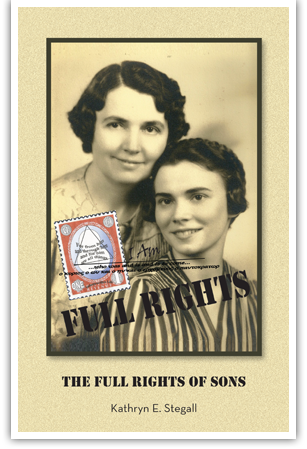 study about the full equality of women in the Bible, written by an astute lay scholar in the Reformed Presbyterian church. She is deeply rooted in her conservative Calvinist tradition which — not incidentally — does not ordain women. In this new work (done through Dog Ear Publishing; $14.99) Stegall shares a bit of memoir (there is an old-fashioned picture of her mother on the cover and heirloom family pictures throughout) and a bit of theological rumination. But mostly, it is careful, studious, and in many ways remarkable evangelical exegesis. Just when I thought I had covered all the main Scriptural texts arguments about our adoption in Christ, and what the confers within the Body of Christ, I am taken aback by this fresh, honest, honorable approach. That the book carries endorsements by passionate Reformed thinkers like John Armstrong and RP pastors like Bruce Hemphill and experienced Biblical counselors like Bonnie Piper (and opens with a wise excerpt from the Westminster Confession) is an indication of its conservative scruples. It is surprising in many ways, and it is very good. Anyway, it is a rare book, and we have it.
study about the full equality of women in the Bible, written by an astute lay scholar in the Reformed Presbyterian church. She is deeply rooted in her conservative Calvinist tradition which — not incidentally — does not ordain women. In this new work (done through Dog Ear Publishing; $14.99) Stegall shares a bit of memoir (there is an old-fashioned picture of her mother on the cover and heirloom family pictures throughout) and a bit of theological rumination. But mostly, it is careful, studious, and in many ways remarkable evangelical exegesis. Just when I thought I had covered all the main Scriptural texts arguments about our adoption in Christ, and what the confers within the Body of Christ, I am taken aback by this fresh, honest, honorable approach. That the book carries endorsements by passionate Reformed thinkers like John Armstrong and RP pastors like Bruce Hemphill and experienced Biblical counselors like Bonnie Piper (and opens with a wise excerpt from the Westminster Confession) is an indication of its conservative scruples. It is surprising in many ways, and it is very good. Anyway, it is a rare book, and we have it.
Also, again, just for example, we’ve been telling folks about the brilliant work of Kenneth E. Bailey for years and his last one is a thick study of 1 Corthinians, but more. It is, as the title suggests, a major work of understanding Paul in his Middle Eastern, first century Greco-Roman/Jewish context: it is called Paul Through Mediterranean Eyes (IVP Academic; $30.00) and it has gotten rave reviews. Also, to learn about the culture of that wild city, I’ve enjoyed A Week in the Life of Corinth by Ben Witherington III (IVP: $16.00) which uses narrative fiction to explore what was going on there.
Tim Keller just released his popular level commentary Judges For You (The Good Book Company; $22.99) which matches his Galatians For You ($22.99.) As the British publisher puts it on the cover of each: “This is to read, pointing you to God’s greatest rescue. This is for you to feed, helping you meditate on God’s Word day by day. This is to lead, equipping you to teach others.”
And we’ve just got the very impressive-looking latest release in the “Interpretation Resources for the
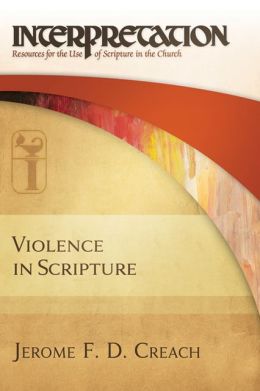 Use of Scripture in the Church” (Westminster/John Knox.) This new one is a big hardback exploring judiciously Violence in Scripture by Jerome F.D. Creach ($35.00.) Creach is an Old Testament prof at Pittsburgh Theological Seminary and a minister in the Presbyterian Church (USA.) He wrote the Joshua commentary in the Interpretation commentary series. I have read a lot in this topic, and hope that this one will be useful. I have heard from a Godly scholar that I trust that it is quite good.
Use of Scripture in the Church” (Westminster/John Knox.) This new one is a big hardback exploring judiciously Violence in Scripture by Jerome F.D. Creach ($35.00.) Creach is an Old Testament prof at Pittsburgh Theological Seminary and a minister in the Presbyterian Church (USA.) He wrote the Joshua commentary in the Interpretation commentary series. I have read a lot in this topic, and hope that this one will be useful. I have heard from a Godly scholar that I trust that it is quite good.
I have already raved about the recent book (which is truly one of the best reading experiences I’ve had all year) on the Psalms by N.T. Wright, The Case for the Psalms: Why They Are Essential (HarperOne; $22.95.) Tom hit a home run with this, and it is fantastic. You really should have it, and I say why, here.
We are, of course, taking pre-orders for his long (long) awaited magisterial work on Paul that is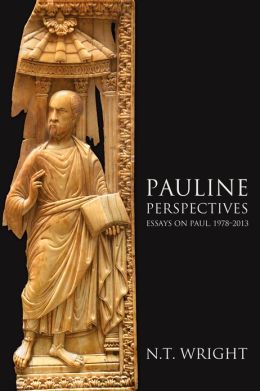
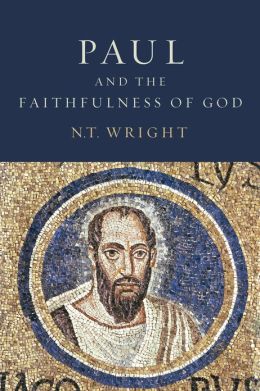 coming out November 1st. As you probably know, it is the fourth in the extraordinary Fortress Press “Christian Origins and the Question of God” series and is his academic life’s work. Agree with it all or not, it is a landmark series, and this is the mature summation of decades of research. It is called Paul and the Faithfulness of God and is a two-volume paperback (1700 pages, selling for $89.00.) Further, there is a supplemental volume being released the same day entitled Pauline Perspectives: Essays on Paul: 1978- 2013 which includes Wright’s important and often auspicious essays, many which have been published in academic journals or anthologies of others work, and some that were delivered as papers or sermons but were never published. It is itself over 800 pages! It regularly sells for $69.00.
coming out November 1st. As you probably know, it is the fourth in the extraordinary Fortress Press “Christian Origins and the Question of God” series and is his academic life’s work. Agree with it all or not, it is a landmark series, and this is the mature summation of decades of research. It is called Paul and the Faithfulness of God and is a two-volume paperback (1700 pages, selling for $89.00.) Further, there is a supplemental volume being released the same day entitled Pauline Perspectives: Essays on Paul: 1978- 2013 which includes Wright’s important and often auspicious essays, many which have been published in academic journals or anthologies of others work, and some that were delivered as papers or sermons but were never published. It is itself over 800 pages! It regularly sells for $69.00.
While our most typical BookNotes discount is a generous 20% off, we are offering a 30% off discount on these on Paul by N.T. Wright. We realize they are hefty and most pastors and those following this kind of work have limited book budgets. We hope this helps. We are grateful that you want to support our work, and look forward to any orders you’d like to send for these. We believe we will have them to ship out before the street date.
J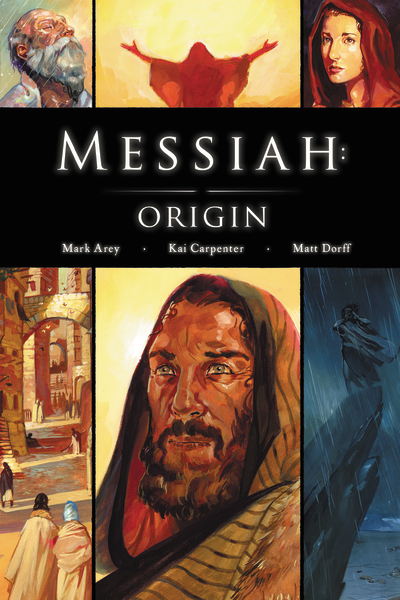 ust to show you the real diversity of the kinds of resources we have, we are very proud to announce that we now have the excellent graphic novel (that is, a classy, bound comic book) called Messiah: Origin by Mark Arey, Kai Carpenter, and Matt Dorff (Zondervan; $19.99.) If you follow these things, and were looking forward to it, you may know that it was fist announced as The Last Adam, which I thought was way cool. Alas, I guess the marketing division felt that not enough people would know what that meant. And they might have been right, which, well, sort of proves my point about needing to buy and read and share these kinds of books that can deepen our Biblical literacy.
ust to show you the real diversity of the kinds of resources we have, we are very proud to announce that we now have the excellent graphic novel (that is, a classy, bound comic book) called Messiah: Origin by Mark Arey, Kai Carpenter, and Matt Dorff (Zondervan; $19.99.) If you follow these things, and were looking forward to it, you may know that it was fist announced as The Last Adam, which I thought was way cool. Alas, I guess the marketing division felt that not enough people would know what that meant. And they might have been right, which, well, sort of proves my point about needing to buy and read and share these kinds of books that can deepen our Biblical literacy.
Anyway, this is really well informed and excellently created within this genre. You may recall how we promoted the breathtakingly good Book of Revelation graphic edition that they did last year. I’m sure you know somebody who might warm up to reading about Jesus in this very contemporary style.
****
Of all the many, many Biblical study resources we stock, the many I’ve perused and used this past year, there is one that I am truly most excited to tell you about. I could go on and on about it, and in fact, I already have. The author and her editor were kind enough to invite me to do a foreword to this book, and I have posted it at the monthly columns section of our website. I am pretty proud of it, myself, the first time I’ve ever done such a thing.
But the book itself is why I’m really excited as it is creative, unique, and very, very well done. Here is a shorter review; I’m trying hard not to write too much, even though I could — there is so much to like about it, and a lot to tell. I think you should consider buying it.
I’ll share my longer review (the foreword to it) that explains and extolls its virtues tomorrow, so look for that, too. For now, let me tell you about a book that I believe could profoundly affect your relationship with the Bible and, more importantly, your relationship with the God of the Bible.
W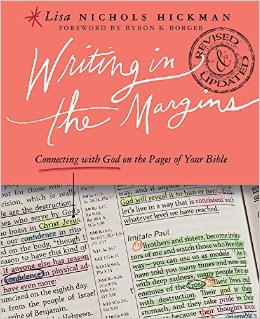 riting in the Margins: Connection with God on the Pages of Your Bible Lisa Nichols Hickman (Abingdon) $16.99 Yep, this is just as it sounds. It is a book about writing in your Bible.
riting in the Margins: Connection with God on the Pages of Your Bible Lisa Nichols Hickman (Abingdon) $16.99 Yep, this is just as it sounds. It is a book about writing in your Bible.
Actually, it is a book about meeting God as you read, as you pick up your pen and open your heart, and allow your study to move beyond paying close attention to the text (always a good first step) to paying close attention to your life. This book, better than any other Bible study resource I have seen, invites you to creatively and playfully actually engage the text, and meet God there. In the margins. In the connections. In the confusions.
(And, dare I say, if there aren’t confusions, you must be reading a different Bible than the rest of us.)
So bring it on — your life, your messes, your questions, your insights, you hopes and dreams. The promises you sense God speaking to you; the challenges and rebukes, too. Write it all out there, on the very pages of your very Holy Bible.
Rev. Hickman, inspired by the Word of God, invites you to write words. God’s Word, your words, it will be an amazing alchemy, and the Spirit will show up. She all but promises it, and after reading her incredible stories (well, not in-credible, really, when you think about it, but amazing) of others who have had transforming spiritual encounters with the Divine Author by not just reading the Word, but interacting with it, processing it, ruminating and engaging it, well, you will be eager to see what God will show you as you get out your own colored pens and pencils and get busy.
Here is how author Lisa Hickman puts it:
The invitation of this book is, at its simplest, to pick up a pen and write in the blank spaces of
your BIble.
It is an invitation to look at the blank spaces of your biblical text and see in the margin around its border an opportunity for a life-giving, transforming, creative conversation between you and the eternal God.
And, importantly and powerfully, she continues,
To have a conversation in the blank spaces holds a particular challenge. You must be comfortable with the wide-open space — not just on the margin on the page but also of the invitation to sit still for an extended period of time, thereby creating the space for a real conversation.
Or, maybe you do not need to be comfortable with the blank spaces. Maybe yo just need to be willing to become comfortable with the stillness. Or you need to be willing to brave the discomfort; I keep finding that some of the most fruitful spiritual experiences of my life come when I am willing to brave the discomfort.
Allow me to observe five quick things that make this book so very, very good.
WELL INFORMED/RELIABLE
First, Lisa Nichols Hickman is an excellent pastor, a sharp thinker, a real book lover and widely read , and it all comes through quite nicely in this enjoyable, stimulating, very interesting book. As a student she attended the CCO’s Jubilee conference and has deep in her vision a wholistic understanding of faith and the relevance of the in-breaking of God’s Kingdom in Christ. She eventually studied at Princeton Seminary, and as a pastor, she has the opportunity to regularly learn from the aforementioned Ken Bailey, who happens to go to her church in Western PA. Again, Lisa is a serious thinker, a lover of words, and understands the Scriptures well, so when she starts asking us to mark up the pages and underline stuff and get all into it, she isn’t being silly or shallow. The book stands upon the solid architecture of the author’s pastoral experience and her proper understanding of the authority of Scripture and how the Triune God speaks through the Word.
, and it all comes through quite nicely in this enjoyable, stimulating, very interesting book. As a student she attended the CCO’s Jubilee conference and has deep in her vision a wholistic understanding of faith and the relevance of the in-breaking of God’s Kingdom in Christ. She eventually studied at Princeton Seminary, and as a pastor, she has the opportunity to regularly learn from the aforementioned Ken Bailey, who happens to go to her church in Western PA. Again, Lisa is a serious thinker, a lover of words, and understands the Scriptures well, so when she starts asking us to mark up the pages and underline stuff and get all into it, she isn’t being silly or shallow. The book stands upon the solid architecture of the author’s pastoral experience and her proper understanding of the authority of Scripture and how the Triune God speaks through the Word.
GREAT STORIES
Secondly, Writing in the Margins is loaded with stories, sidebars, examples, and testimonies of those who have written in the margins, connected the dots, processed passages with line and color, symbols and codes. Their well-told stories are not only a delight to read, they are themselves very insightful. Too many folks traffic in cliches and “Christianese” when they talk about their faith, and this book seems honest and real, as devout followers of Jesus grapple with the words, and listen for The Word. I am sure you’ll be inspired and moved by it.
CLASSY CITATIONS & QUOTES
Thirdly, Lisa, as I said, is a good reader herself, and she cites some wonderful folks. From memoirist Mary Karr to theologian Frederick Buechner, from Pulitzer Prize winning literary light Annie Dillard to (of course, come to think of it) the old school bookman himself Mortimer Adler, she brings just enough helpers along to make this a gem of a read. She is a good writer herself, and not every book about spiritual formation or lectio devino or Biblical scholarship is this classy.
WONDERFULLY DESIGNED
I almost put this first: Writing in the Margins book is lovely in its design. From the wonderful cover to the fantastic sidebars to the doodles and designs that are all over the margins, this book practices what it preaches, shows us how to do it by being itself marked up and creatively presented. I suspect you have not often seen a book like this before. Kudos to the folks at Abingdon for a upbeat and clever way to make the point, giving us a work of art in this paperback.
PROPHETIC SOCIAL VISION
Number five: Writing… has a bit of a prophetic, social edge to it: Hickman thinks you find God, I guess by way of a metaphor, on the margins of the page. On the edges. Okay, you could meet God by writing in a tablet or journal, too, but there is something special going on when you are writing right on the same page as Holy Writ. But revisit that image of meeting God in the margins, along the edges. There is this profound reminder here that, as she explains, the God of the Bible is a God of the marginal. From the Levitical laws of gleaning and leaving margins in the field for the poor to Hebrew prophets insisting that true spirituality must include advocacy for the oppressed, to Jesus’ own relationships with the nobodies and outcasts, it is true that the God of the Bible is a God of the margins. Deal with it. Literally. Write on the margins, and see if God has something to say.
As Hickman puts it, “God’s best work occurs in the margins. If we have the courage to step into tha t wide-open space, God will meet us there.”
t wide-open space, God will meet us there.”
I could list five more things I like about this book, but some of them will be mentioned in my own passionate piece from it that I’ll post tomorrow.
Now, just know this: if you are a long time Bible reader, but maybe the text is growing stale for you, this book can help. In one of the very moving testimonies which is a full page side-bar, Renee Aukeman Prymus tells of her colorful, now duct-taped, compact Bible which she had as a youth — it went everywhere with her, on overseas missions trips and other profound life adventures. She wonders why the flame has gone dim, why she doesn’t enjoy her BIble as much as she once did. You may feel God’s own prompting yourself when you read her story, and these final words:
As I look through those pages, I stand in awe at my younger self. I was dedicated, devoted,and diligent in my studies, my prayers, and my relationship with God. I know that person is still inside me, still dedicated and devoted. Maybe I can discover her again.
Next to Exodus 14:13-14, where Moses tells the people not to be afraid in the face of the Egyptians, I wrote “prescription for unexpected life.” Somehow, moving back into the margins might help me live into that adventure.
There are really fun things in this book such as an awesome footnote link to a Lapham’s Quarterly article by the popular genius Maria Popova, documenting complaints and snarky notes scribbled by disgruntled monks on medieval manuscripts, a truly moving (and surprising) listing of some of the great things in the margins of street preacher and fundamentalist Bible scholar Dr. H.A. Ironside, and lots of very cool quotes — inspiring ones about church music found in the Bible of J.S. Bach to the one famous bit of marginalia in the Bible of Abraham Lincoln, to a great line by feisty historian Studs Turkel.
Oh yes, you will learn a lot in this handsome, curious book. You will learn how to be a better reader, an active one, engaged and involved in the text.
But, more importantly, you will experience a new (or revive an old) habit: using underlinings and stars and explanation points and your own heart-felt words and sighs, written out on the page, enabling you to meet God — smack dab in the middle of the margins, where Word meets world.

DISCOUNT
ANY ITEM MENTIONED
20% off
(30% off the N.T. Wright Paul books) order here
takes you to the secure Hearts & Minds order form page
just tell us what you want
inquire here
if you have questions or need more information
just ask us what you want to know
Hearts & Minds 234 East Main Street Dallastown, PA 17313 717-246-3333
read@heartsandmindsbooks.com
